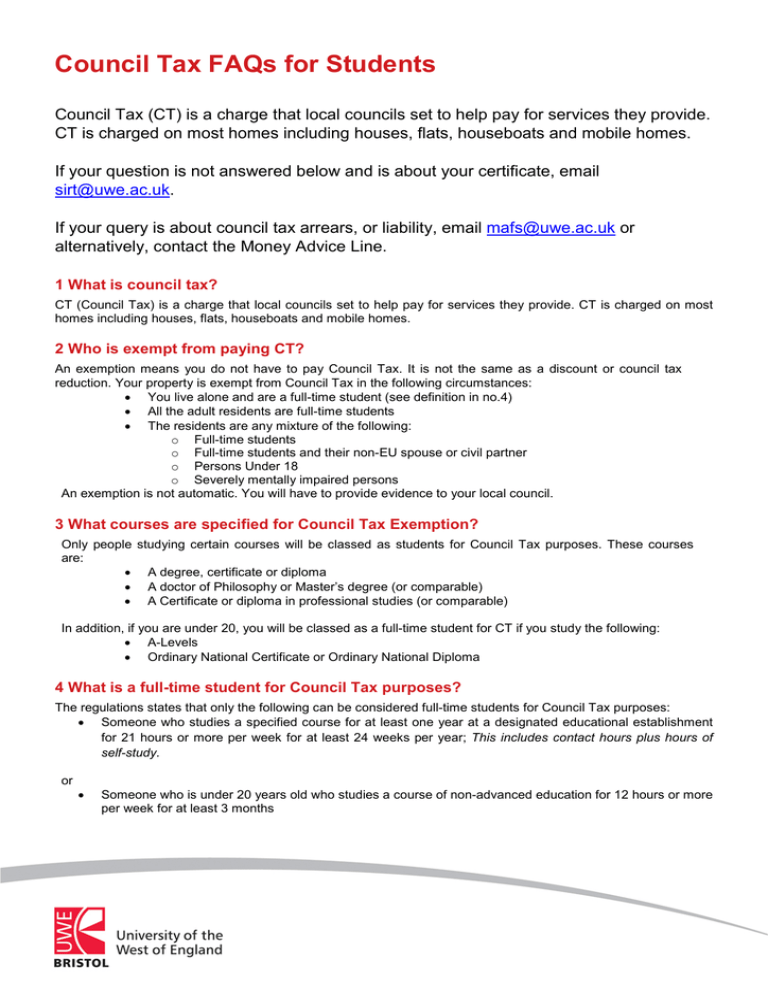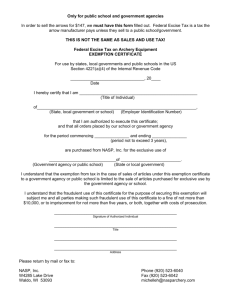Student Council Tax FAQs
advertisement

Council Tax FAQs for Students Council Tax (CT) is a charge that local councils set to help pay for services they provide. CT is charged on most homes including houses, flats, houseboats and mobile homes. If your question is not answered below and is about your certificate, email sirt@uwe.ac.uk. If your query is about council tax arrears, or liability, email mafs@uwe.ac.uk or alternatively, contact the Money Advice Line. 1 What is council tax? CT (Council Tax) is a charge that local councils set to help pay for services they provide. CT is charged on most homes including houses, flats, houseboats and mobile homes. 2 Who is exempt from paying CT? An exemption means you do not have to pay Council Tax. It is not the same as a discount or council tax reduction. Your property is exempt from Council Tax in the following circumstances: • You live alone and are a full-time student (see definition in no.4) • All the adult residents are full-time students • The residents are any mixture of the following: o Full-time students o Full-time students and their non-EU spouse or civil partner o Persons Under 18 o Severely mentally impaired persons An exemption is not automatic. You will have to provide evidence to your local council. 3 What courses are specified for Council Tax Exemption? Only people studying certain courses will be classed as students for Council Tax purposes. These courses are: • A degree, certificate or diploma • A doctor of Philosophy or Master’s degree (or comparable) • A Certificate or diploma in professional studies (or comparable) In addition, if you are under 20, you will be classed as a full-time student for CT if you study the following: • A-Levels • Ordinary National Certificate or Ordinary National Diploma 4 What is a full-time student for Council Tax purposes? The regulations states that only the following can be considered full-time students for Council Tax purposes: • Someone who studies a specified course for at least one year at a designated educational establishment for 21 hours or more per week for at least 24 weeks per year; This includes contact hours plus hours of self-study. or • Someone who is under 20 years old who studies a course of non-advanced education for 12 hours or more per week for at least 3 months 5 How do I apply for CT exemption? There are 2 methods by which a local authority can be advised of your eligibility for CT exemption: 1. A MyUWE Council Tax Certificate (see 6 below) 2. A manually produced certificate (ask at an Infopoint) In addition, UWE provides Termly Reports of Full Time/Sandwich students to Local Councils. 6 How do I produce a MyUWE Council Tax Certificate? Follow the guidance. The MyUWE Council Tax Certificate includes a unique hyperlink which councils can be used to verify that the certificate has been produced by MyUWE. 7 I am an international or EU student – what are the rules for me? The CT rules are the same for International, EU and UK students. If you are an international student living with a spouse/civil partner from outside the EU, they may be exempt from CT if they can prove that they either have no recourse to public funds or are prohibited from taking paid employment. This will be shown on their biometric residence permit. 8 I am a part-time student- what are the rules for me? If you are a true part-time student, you are usually not exempt. If you are UK or EU, you may be able to get help with the bill by applying for Council Tax reduction from the local council. There are certain part-time courses that meet the contact hours’ requirement as at no. 4 above. In particular, NHSfunded undergraduates taking 60% or 75% of a full-time course are likely to be exempt from CT. In this case, please go to a UWE Infopoint to request a manual CT certificate. If you are a full-time student attending the full-time course on a part-time basis you should remain exempt for CT until you complete your course. 9 I am studying a pre-sessional English course at UWE- do I have to pay CT? Yes, you do have to pay CT unless you live in UWE student accommodation or you are under 20 years of age when you start your pre-sessional English course and the course will: 1. Last at least 3 months and 2. Involve at least 12 hours of study per week. This is ‘contact’ hours only rather than including hours of selfstudy. Please request a manual CT certificate from Infopoint if you are under 20 and your course meets the requirements of nos. 1 and 2 above. 10 What if I’m studying a short course? (less than one academic year?) Students registered on a short-course, even on a full-time basis, are not entitled to a CT exemption. The one exception is if you are a student under 20-years of age and your course meets the requirements at no.9 above. 11 I have just completed my foundation degree and am topping-up to a full degree? Students who move from a Foundation Degree (or HND) to an honours degree, (even if entering into the final year) are non-students in the gap between the two courses. Under CT law, they are seen as completing the foundation degree course and 3 months later, starting a new course. So from the day after a student completes their foundation degree up to and including the day before they start their top-up course, the student is liable for CT. Students moving from a degree to a PGCE or other postgraduate course will also be liable during the period between the two courses. This is because the student is not within the formal attendance period of either course. As a non-student, UK and possibly EU students may be eligible to claim council tax reduction (formerly council tax benefit) to cover the liability. Are there any exceptions? This does not include students who are taking an ‘integrated’ FY0 (foundation-year zero) and moving to year 1 of the degree, or students who are transferring between two full-time courses with the summer vacation between. In both these cases, the exemption continues during the summer vacation between the 2 courses. You will need to request a manually produced exemption certificate from Infopoints. 12 Can I get a CT Discount? You are entitled to a 25% discount on your council tax bill if: • You live alone or • You live with someone else, but they are not counted for CT purposes – for example children under the age of 18, full-time students and live-in carers Example: John, a full-time student lives with his wife Debbie and their 5 year-old child. As there is only one liable adult in the household, Debbie, she can apply for the single person’s discount. She completes the form and supplies proof of John’s student status. The CT bill is reduced by 25% 13 Are there circumstances when full-time students have to pay CT? There is a pecking order of liability based on the legal relationship with the property. Two examples where a fulltime student may receive and have to pay a CT bill: • A single-parent tenant will receive a CT bill but their 20 year-old son would not • If the full-time student owns the property and sublets a room to a non-student, the property becomes liable. As the student is the owner, they have a higher interest in the property than the lodger 14 I am a final year student, when will my exemption cease? The period of your exemption is linked to the normal attendance period for your course. The exemption ends with the day (‘the last day’) on which you complete it. This will be the last day of the assessment period in the last term of study. See no. 15 if you have resits after the end of your final term. 15 I have resits and I am a final year student If the resit period comes after the final term, then you are not exempt beyond the last day of the assessment period in the final term of your course. Your exemption lasts until the end of ‘normal attendance’. This means you will be liable for CT over the summer vacation and covering the resit period. 17 I have retakes, how do I get an extension to my exemption? As a non-final year student, if you know that you will need a further year of study to complete your course, request an extension to your certificate from Infopoint once your results are published. If, as a final year student, you can complete the course at resits but fail and then are permitted retakes in the following year, we cannot issue an extension certificate until the date that retakes are permitted. We must then wait for you to register for the next academic year, at which point we will be able to provide an extension certificate backdated to cover the summer and up until the new end date of the following academic year. This means that you should be repaid any CT that you have paid over the summer. 18 How do Postgraduates prove they are exempt? Full-time postgraduate students should be regarded as exempt during writing up periods. Unfortunately, postgraduate research students sometimes find it difficult to secure their rightful CT exemption. Some local authorities don’t believe their periods of study, tuition or work experience meet the requirements – often because the periods of study don’t take place on campus. However, the legislation explicitly states that study doesn’t need to be at the institution and such refusals having been successfully challenged – notably in an appeal in Kent. (Kent Valuation Tribunal – appeal 2220M23702/148C/1). 19 Do I have to pay CT if I suspend my studies? FT Students who suspend (AKA ‘time-out’/’intercalates’) from the course should still be exempt from CT liability. Why? Because the definition of a full-time student is one who is undertaking a course continuously until the day on which he ceases to undertake it. ‘Ceasing to undertake a course’ is defined as completed, abandoned or dismissed from it. It does not include ‘suspension’ or ‘timing out’ as a means of ceasing to undertake it. You will need to request a manual exemption certificate from an Infopoint. 20 The Start Date and/or Expected End Date on the certificate is wrong - what should I do? These fields are intended to reflect your actual dates of attendance. Students often wish these dates to reflect other things such as an award board date or the end of a resit period. The end date is set as the last day of the assessment period in your last term of study. If you have a query about the dates, please contact sirt@uwe.ac.uk. 21 The Award Board Date is later than the Expected End Date on my certificate - what should I do? The award board date is not relevant for CT exemption. For the purposes of CT, you are exempt until the last day of the assessment period in your final term. 22 I have produced a certificate from MyUWE, but the council has rejected it Go to an Infopoint to request a manually produced certificate which will meet the requirements. If the council has rejected the manually produced certificate, inform Student Information Request Team via email – SIRT@UWE.ac.uk. 23 My query is not answered here If your query is about your certificate, email sirt@uwe.ac.uk. If your query is about council tax arrears, or liability, email your query to mafs@uwe.ac.uk or alternatively, contact the Money Advice Line.

